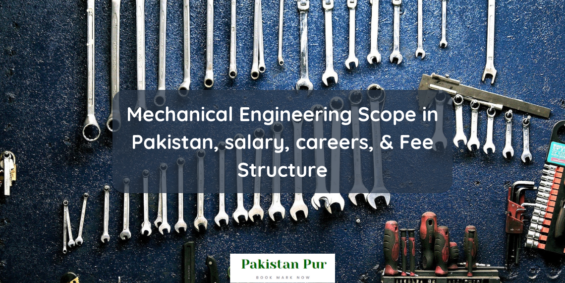
Table of Contents
Mechanical Engineering is a diverse field that combines principles of physics and engineering to design, analyze, and improve mechanical processes.
BS Mechanical Engineering in Pakistan is a 4-year undergraduate degree program that equips students with a solid foundation in the field of mechanical engineering.
It focuses on various aspects such as the production and usage of heat and mechanical power, the design and analysis of production systems, and the application of engineering principles to solve real-world problems.
Some universities and colleges offering this program in Pakistan include Mehran University of Engineering & Technology, University of Management and Technology, and Superior University Lahore.
With a strong emphasis on both theoretical knowledge and practical skills, this program prepares students for a wide range of career opportunities in industries related to manufacturing, automotive, energy, and more.
Mechanical Engineering is one of the most promising fields after FSc Pre Engineering. Read the full list of the best degrees and Best Fields after FSc pre Engineering in Pakistan.

Scope of Mechanical Engineering in Pakistan
Mechanical Engineering in Pakistan offers a wide scope with promising career prospects. Industries such as aerospace, automotive, and nuclear provide job opportunities for mechanical engineers.
The average salary for mechanical engineers in Pakistan is around PKR 471,036 per year, with entry-level positions starting at PKR 30,000. With a strong demand for skilled professionals in this field, there are ample opportunities for growth and development.
Mechanical engineers can progress in their careers and take on higher-level positions with continuous learning and staying updated with the latest technological advancements. Overall, the scope of mechanical engineering in Pakistan is vast, offering a bright future for those interested in this field.
Let’s explore more details of the scope of BS Mechanical Engineering in Pakistan.
Industries for BS Mechanical Engineering
These are the largest employer industries for BS mechanical engineering graduates. This is not an exhaustive list and many other industries demand mechanical engineers.
- Aerospace Industry: Involves the design, development, and manufacturing of aircraft and spacecraft.
- Automotive Industry: Focuses on the design, production, and maintenance of automobiles and their components.
- Energy Industry: Deals with the generation, distribution, and utilization of various forms of energy such as renewable energy, power plants, and the oil and gas industry.
- Manufacturing Industry: Involves the production of goods using mechanical processes, including machinery design, automation, and quality control.
- Construction Industry: Engages in the planning, design, and construction of buildings, infrastructure projects, and related mechanical systems.
- Oil and Gas Industry: Deals with the exploration, extraction, refining, and distribution of oil and natural gas resources.
- Pharmaceutical Industry: Involves the design and production of machinery used in pharmaceutical manufacturing and packaging processes.
- HVAC Industry: Specializes in heating, ventilation, and air conditioning systems for commercial, residential, and industrial applications.
- Defense Industry: Focuses on the design and manufacturing of military equipment, weapons, and vehicles.
- Robotics Industry: Involves the development and application of mechanical systems and robots for various industries, including healthcare, manufacturing, and automation.
Career for BS Mechanical Engineers in Pakistan
These are the top career paths for BS Mechanical Engineering graduates in Pakistan.
- Maintenance Engineer: Responsible for ensuring the smooth operation and maintenance of machinery and equipment in industries.
- Automotive Engineer: Involved in the design, development, and improvement of automotive systems and components.
- Aerospace Engineer: Works on the design, production, and testing of aircraft and spacecraft.
- Nuclear Engineer: Deals with the design, development, and maintenance of nuclear power plants and related systems.
- Manufacturing Engineer: Focuses on optimizing production processes, improving efficiency, and implementing quality control measures in manufacturing industries.
- HVAC Engineer: Specializes in designing, installing, and maintaining heating, ventilation, and air conditioning systems for buildings and industrial facilities.
- Energy Engineer: Works on energy generation, distribution, and optimization projects, including renewable energy sources and energy management systems.
- Research and Development Engineer: Engaged in exploring new technologies, conducting experiments, and developing innovative solutions for various mechanical engineering applications.
- Consulting Engineer: Provides expert advice and solutions to companies and clients on mechanical engineering projects and challenges.
- Teaching and Academia: Pursue a career in teaching and research, sharing knowledge and training the next generation of mechanical engineers.
Salary Expectations for BS Mechanical Engineering Graduates
According to Indeed, the salary expectations for BS Mechanical Engineering graduates in Pakistan can vary depending on factors such as experience, skills, and industry.
While specific salary figures may differ, here is an overview of the salary range found in the search results on Indeed and PayScale.
The entry-level positions for graduate mechanical engineers in Pakistan offer salaries ranging from approximately Rs 30,000 to Rs 90,000 per month. However, it is important to note that these figures are not exhaustive and should be taken as estimates based on the job postings found during the search.
Further Education after BS Mechanical Engineering
After completing a Bachelor’s degree in Mechanical Engineering, several further education options can enhance career prospects and open up new opportunities. Here are some popular choices:
- Master of Technology (M.Tech) in Mechanical Engineering: Pursuing an advanced degree can provide specialized knowledge and research opportunities in various subfields of mechanical engineering.
- Mechatronics: This interdisciplinary field combines mechanical engineering, electronics, computer science, and control engineering, enabling graduates to work on advanced automation and robotics systems.
- Supply Chain Management: Gaining expertise in supply chain management equips engineers with skills in logistics, procurement, and operations, making them valuable in industries with complex supply networks.
- Master’s in Automotive Engineering: This program focuses on advanced automotive technology, vehicle design, and manufacturing processes, preparing graduates for careers in the automotive industry.
- Materials Engineering: Specializing in materials engineering can lead to opportunities in research and development of new materials, product design, and quality control.
It’s important to note that these pathways may require additional prerequisites or entrance exams, and the availability of programs may vary. Researching specific universities and their offerings will provide more detailed information on admission requirements and curriculum.
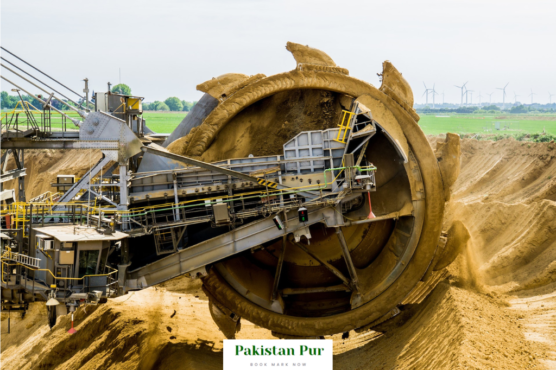
BS Mechanical Engineering Syllabus and Subjects
The syllabus for BS Mechanical Engineering typically includes a range of fundamental coursework and specialized subjects. While the exact curriculum may vary between universities, here is a list of common subjects studied in the program:
- Engineering Mathematics
- Engineering Graphics
- General Chemistry
- Material Science
- Basic Thermodynamics
- Fluid Mechanics
- Solid Mechanics
- Heat and Mass Transfer
- Dynamics and Vibrations
- Mechatronics and Robotics
- Energy Engineering
- Machine Design
- Control Systems
- Manufacturing Processes
- Engineering Economics
HEC Syllabus for BS Mechanical Engineering in Pakistan
Here is a semester-wise HEC Syllabus for BS Mechanical Engineering in Pakistan. The syllabus was developed by HEC with input from the Pakistan Engineering Council.
BS Mechanical Engineering: Semester 1 Subjects
- Mathematics-1
- Applied Physics
- Applied Chemistry
- Functional English
- Computer Systems and Programming
- Engineering Drawing and Graphics
- Introduction to Engineering
BS Mechanical Engineering: Semester 2 Subjects
- Computer Aided Drawing
- Electrical Engineering
- Mathematics-2
- Communication Skills
- Workshop Practice
- Engineering Mechanics-I: Statics
- Engineering Materials
BS Mechanical Engineering: Semester 3 Subjects
- Pakistan Studies
- Engineering Mechanics-II: Dynamics
- Mechanics of Materials–I
- Thermodynamics-I
- Technical Report Writing and Presentation Skills
- Engineering Mechanics Lab
- Mathematics-3
BS Mechanical Engineering: Semester 4 Subjects
- Electronics Engineering
- Thermodynamics-II
- Social Sciences (Elective)
- Machine Design-I
- Mechanics of Materials–II
- Mechanics of Materials Lab
- Fluid Mechanics-I
- Thermodynamics Lab
BS Mechanical Engineering: Semester 5 Subjects
- Fluid Mechanics-II
- Mathematics-4
- Machine Design -II
- Instrumentation and Measurement
- Heat & Mass Transfer
- Manufacturing Processes
- Fluid Mechanics Lab
BS Mechanical Engineering: Semester 6 Subjects
- Engineering Statics
- Technical Elective-I
- Control Engineering
- Mechanics of Machines
- Heating, Ventilating and Air Conditioning
- Heat Transfer and HVAC Lab
- Health, Safety and Environment
BS Mechanical Engineering: Semester 7 Subjects
- Engineering Economics
- Mechanical Vibrations
- Internal Combustion Engines
- Technical Elective-II
- Senior Design Project-I
- Mechanisms and Mechanical Vibrations Lab
- Introduction to Finite Element Analysis
BS Mechanical Engineering: Semester 8 Subjects
- Islamic Studies/ Ethics
- Technical Elective-III
- Management Elective
- Entrepreneurship
- Power Plants
- IC Engines & Power Plants Lab
- Senior Design Project-II
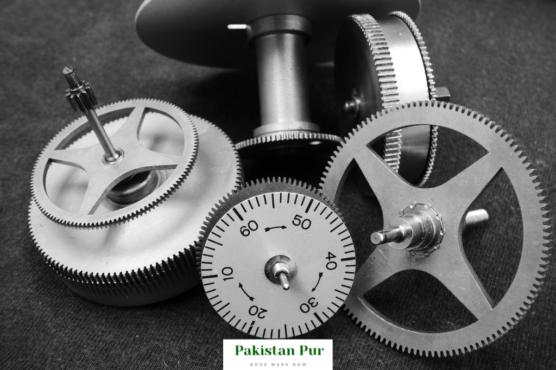
BS Mechanical Engineering Eligibility Criteria in Pakistan
To pursue a Bachelor’s degree in Mechanical Engineering (BS Mechanical Engineering) in Pakistan, there are specific eligibility criteria that students must meet. Here are the general requirements:
- Academic Qualifications: Applicants should have completed their intermediate education with a science background. The accepted qualifications may vary between institutions but typically include
- Higher Secondary School Certificate (HSSC) or equivalent with a minimum of 60% marks.
- Pre-Engineering or FSc (Pre-Engineering) with at least 60% marks.
- Diploma of Associate Engineering (DAE) with a first division in a relevant technology.
- Entrance Test: Most universities in Pakistan require applicants to take an entrance test for admission to the BS Mechanical Engineering program. The entrance test score, along with academic performance, is often considered in the admission process. The minimum required score may differ among institutions.
- Additional Requirements: Some universities may have specific additional requirements or preferences for admission, such as an interview or submission of a personal statement.
It’s important to note that the eligibility criteria mentioned here are general guidelines and may vary between universities and programs.
Students are advised to check the official websites of the respective universities for the most accurate and up-to-date information regarding eligibility criteria and admission procedures.
BSc Mechanical Engineering Admission in Pakistan
Mechanical Engineering Admission Requirements in Pakistan
The admission criteria for Mechanical Engineering programs across Pakistani universities are characterized by certain common prerequisites.
- Educational Background: Applicants must have completed 12 years of formal education.
- Subject Requirements: A background in FSc (Maths, Physics, Chemistry) or DAE (Mechanical) is essential.
- International Curriculum: A-Levels or equivalent qualifications are also acceptable.
- Academic Achievement: A minimum score of 60% is typically required.
- Entrance Test: Most universities require candidates to clear an entrance test.
This guide provides a general overview. However, specific requirements may vary across institutions, so it’s recommended to check with the respective university for precise information.
Note: Please verify all details from the official university websites or contact the universities directly to get the most accurate and up-to-date information.
UOL Mechanical Engineering Admission Criteria
The University of Lahore (UOL) sets forth specific prerequisites for prospective students interested in the Mechanical Engineering program. These requirements ensure that students possess the necessary foundational knowledge to excel in this demanding field.
Admission Criteria:
- Educational Background: Applicants must have completed 12 years of formal education, ensuring they have the necessary academic foundation.
- Relevant Subjects: Candidates should have studied FSc with a combination of Mathematics, Physics, and Chemistry. Alternatively, ICS with Mathematics, Physics, and Computer Sciences (Mechanical) is also acceptable.
- International Standards: If you have pursued an international curriculum such as A-Level or an equivalent course, these qualifications are also recognized.
- Academic Excellence: Regardless of the curriculum followed, applicants must have secured a minimum of 60% marks, reflecting their commitment and understanding of the subjects involved.
- UOL Entry Test: Additionally, clearing the UOL Entry Test is a mandatory step in the admission process. This assessment evaluates the applicant’s aptitude and readiness for the program.
By adhering to these criteria, you can ensure a smooth application process and increase your chances of securing a seat in UOL’s esteemed Mechanical Engineering program.
Admission for MS Mechanical Engineering in NUST
Applying for a Master’s program can be daunting, especially when it’s at a prestigious institution like the National University of Sciences and Technology (NUST). To help you navigate this process, we’ve broken down the key admission criteria for their MS Mechanical Engineering program.
Eligibility Criteria
- Educational Qualification: Applicants must have completed sixteen years of schooling or possess a 4-year education after HSSC/A Level in a relevant discipline.
- Minimum CGPA/Marks: A minimum CGPA of 2.0 out of 4.0 or 55% marks is required.
Admission Process
- Merit Generation: Merit generation for MS admission at NUST is based on academic performance (CGPA) and test scores from GAT (Gen) / GRE (International) / GMAT / HAT.
- HEC Verification: If you’re applying with an MS/MPhil/Equivalent degree, it must be verified by the Higher Education Commission (HEC).
- GRE/GAT Score Validity: Your GRE/GAT score must be valid at the start of the semester date/joining date of the MS program.
This guide offers you a comprehensive understanding of what NUST expects from its prospective MS Mechanical Engineering students. However, it’s always recommended to check the official NUST website for the most up-to-date and detailed information.
Admission in Mechanical Engineering for A DAE Student
For Diploma of Associate Engineering (DAE) students aspiring for a Mechanical Engineering degree in Pakistan, here are the key eligibility criteria and admission process:
- Academic Requirements: Completion of a DAE with at least 60% marks in both Matric and DAE.
- Merit-Based Admission: Admission is granted on open merit.
- Relevant Field: The DAE should be in a relevant field.
- Age Limit: Applicants should not be older than 22 years.
The admission process typically involves applying to the university, submitting the required documents, and participating in any entrance exams or interviews as specified by the institution.
Note: Please verify all details from the official university websites or contact the universities directly to get the most accurate and up-to-date information.
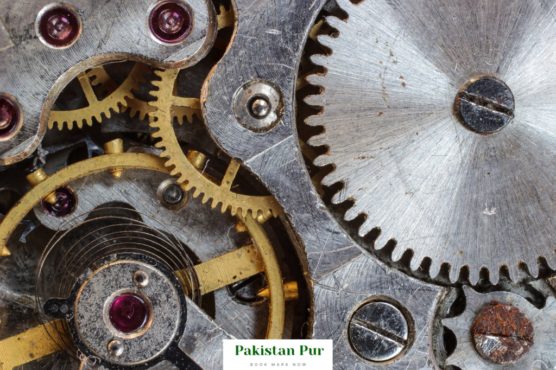
Fee Structure for BS Mechanical Engineering in Pakistan
UET Lahore Mechanical Engineering Fee Structure
I will discuss the BS Mechanical Engineering in UET Lahore fee structure. If you want to know the fee structure for MS Mechanical Engineering in UET fee structure, please contact the university admission office.
- Admission Fee: Rs. 49,760
- Total 1st Semester Fee: Rs. 100,337
- Total Program Fee: Rs. 620,156
NUST Mechanical Engineering Fee Structure,
I will discuss the fee structure for BS Mechanical Engineering in NUST. For the MS Mechanical Engineering program at NUST, please contact the University admission office.
- Admission Fee: Rs. 35,000
- Total 1st Semester Fee: Rs. 196,700
- Total Program Fee: Rs. 12,58,600
UCP Fee Structure for Mechanical Engineering
This is the fee structure for BSc Mechanical Engineering at the University of Central Punjab, Lahore.
- Admission Fee: Rs. 25,000
- Total 1st Semester Fee: Rs. 193,750
- Total Program Fee: Rs. 14,50,000
Air University Mechanical Engineering Fee Structure
This is the fee structure for BS Mechanical Engineering at Air University, Islamabad.
- Admission Fee: Rs. 20,000
- Total 1st Semester Fee: Rs. 148,825
- Total Program Fee: Rs. 889,600
Mechanical Engineering vs Other Engineering Fields
Civil Engineering vs Mechanical Engineering
Choosing between Civil and Mechanical Engineering involves weighing your interests, career aspirations, and the job market. Here’s a brief comparison to guide your decision:
Civil Engineering
Definition: Civil Engineering is about creating, improving, and protecting the environment in which we live.
Scope: It involves planning, designing, and overseeing the construction and maintenance of building structures and infrastructure.
Job Prospects: Demand for Civil Engineers is projected to grow, especially in sustainable and green technologies.
Employing Industries: Infrastructure development companies, government agencies, and environmental consultancies.
Mechanical Engineering
Definition: Mechanical Engineering applies principles of engineering, physics, and materials science for the design, analysis, manufacturing, and maintenance of mechanical systems.
Scope: It covers everything from computer chips to power plants.
Job Prospects: Robust opportunities across industries, particularly in areas like robotics and automation.
Employing Industries: Automotive, aerospace, energy, and manufacturing sectors.
Choose the field that aligns best with your passion and career goals.
Chemical Vs Mechanical Vs Civil Engineering
Choosing the right engineering field is a critical decision. Here’s a comparison table to guide you:
| Criteria | Chemical Engineering | Mechanical Engineering | Civil Engineering |
| Definition | Applies principles of chemistry, biology, physics, and math to solve problems related to the production or use of chemicals. | Applies engineering, physics, and materials science principles to design, analyze, manufacture, and maintain mechanical systems. | Involves designing, constructing, and maintaining infrastructure like bridges, roads, and buildings. |
| Scope | Covers areas like biotechnology, and pharmaceuticals, electronic device fabrication, and environmental engineering. | Broad scope, covers everything from automotive to energy sectors. | Specializes in areas such as structural, environmental, and transportation engineering. |
| Job Prospects | Expected growth in areas like alternative energies and nanotechnology. | Robust opportunities, especially in automation and robotics. | Strong demand, particularly for sustainable and green technologies. |
| Employing Industries | Chemical, pharmaceutical, healthcare, design and construction, pulp and paper, petrochemicals, and food processing. | Automotive, aerospace, energy, and manufacturing. | Infrastructure development companies, government agencies, and environmental consultancies. |
Remember, your choice should align with your interests, skills, and long-term career goals.
Mechanical Technology Vs Mechanical Engineering
Choosing between Mechanical Technology and Mechanical Engineering can be complex. Here’s a comparison table to help you make an informed decision:
| Criteria | Mechanical Technology | Mechanical Engineering |
| Definition | Focuses on the hands-on aspect of mechanical systems, implementing designs and solutions. | Applies principles of engineering, physics, and materials science to design, analyze, manufacture, and maintain mechanical systems. |
| Scope | Involves tasks like equipment testing, troubleshooting, and installation. | Broad scope, covering everything from automotive to energy sectors. |
| Job Prospects | Opportunities as technicians or technologists in manufacturing and service sectors. | Robust opportunities across industries, especially in automation and robotics. |
| Employing Industries | Manufacturing, automotive repair, heating, and cooling systems. | Automotive, aerospace, energy, and manufacturing. |
Whether you choose Mechanical Technology or Mechanical Engineering, ensure that your choice aligns with your career goals and interests.
Mechanical vs Mechatronics Engineering
Choosing between Mechanical and Mechatronics Engineering is a significant step. This comparison table is designed to deliver the essential information you need to make an informed decision:
| Criteria | Mechanical Engineering | Mechatronics Engineering |
| Definition | Mechanical Engineering applies principles of engineering, physics, and materials science for the design, analysis, manufacturing, and maintenance of mechanical systems. | Mechatronics Engineering is an interdisciplinary field that combines elements of mechanical, electronics, computer, and control engineering to design and manufacture products. |
| Scope | It covers everything from the automotive to energy sectors. | It spans across robotics, automation, electronics, telecommunication, bioengineering, and more. |
| Job Prospects | Robust opportunities across industries, particularly in areas like robotics and automation. | Increasing demand in sectors like robotics, automation, and advanced manufacturing due to the rise of Industry 4.0. |
| Employing Industries | Automotive, aerospace, energy, and manufacturing. | Robotics, automotive, aerospace, telecommunications, IT, and industrial automation. |
Robotics Vs Mechanical Engineering
| Criteria | Robotics Engineering | Mechanical Engineering |
| Definition | Focuses on designing, creating, and applying robots. | Concentrates on designing and maintaining mechanical systems. |
| Scope | Broadly covers automation, AI, and robotics. | Encompasses the automotive to energy sectors. |
| Job Prospects | Growing opportunities in tech and manufacturing. | Wide-ranging prospects, notably in automation. |
| Employing Industries | Tech, automotive, healthcare. | Automotive, aerospace, energy. |

Architecture Vs Mechanical Engineering
| Criteria | Architecture | Mechanical Engineering |
| Definition | Focuses on designing and planning buildings. | Involves designing and maintaining mechanical systems. |
| Scope | Covers urban design, and landscape architecture. | Spans from automotive to energy sectors. |
| Job Prospects | Opportunities in design firms, construction. | Prospects in automation, manufacturing. |
| Employing Industries | Construction, real estate. | Automotive, aerospace, energy. |
Mechanical Vs Materials Engineering
| Criteria | Mechanical Engineering | Materials Engineering |
| Definition | A discipline that applies principles of physics and materials science to design, analyze, and manufacture, and maintain mechanical systems. | A field that investigates the relationship between the structure of materials at atomic or molecular scales and their macroscopic properties. |
| Scope | It touches everything from the automotive to energy sectors. | It covers areas like ceramics, metals, polymers, composites, and biomaterials. |
| Job Prospects | Opportunities abound across industries, particularly in robotics and automation. | Promising prospects in research, manufacturing, and development4. |
| Employing Industries | Automotive, aerospace, energy, and manufacturing. | Electronics, automotive, aerospace, and medical devices. |
Aerospace Engineering Vs Mechanical Engineering
| Criteria | Aerospace Engineering | Mechanical Engineering |
| Definition | A specialized branch of engineering focused on the design, construction, and application of aircraft and spacecraft. | An expansive field that applies principles of physics and materials science for the design, analysis, manufacturing, and maintenance of mechanical systems. |
| Scope | Covers areas such as aerodynamics, avionics, and propulsion systems. | Encompasses a broad range from automotive to energy sectors. |
| Job Prospects | Opportunities in design, manufacturing, and testing of air and spacecraft. | Wide-ranging prospects, notably in robotics, automation, and manufacturing. |
| Employing Industries | Aerospace, defense, and research institutions. | Automotive, aerospace, energy, manufacturing. |
FAQs
What Is The Salary Of Mechanical Engineer In Pakistan?
The salary of a Mechanical Engineer in Pakistan varies based on factors such as city, experience, and specific industry. On average, a Mechanical Engineer earns around PKR 50,000 per month. Annually, this amounts to approximately Rs 523,090. However, salaries can range from 39,900 PKR to 117,000 PKR.
Is Mechanical Engineering A Good Career In Pakistan?
Mechanical Engineering is considered a promising career in Pakistan. With the industrial sector’s rapid expansion, job prospects for mechanical engineers are high. Fields like aerospace, automotive, and maintenance engineering offer opportunities. The demand for mechanical engineers is substantial due to their skills in designing power-producing machines.
Which University Is Best For Mechanical Engineering In Pakistan?
NUST, or National University of Science and Technology Islamabad can be considered the best for mechanical engineering in Pakistan as it ranks the highest for mechanical engineering subjects in the QS World Universities Ranking.
Can I do Mechanical Engineering After ICS in Pakistan?
Absolutely! After completing your Intermediate in Computer Sciences (ICS), you can pursue Mechanical Engineering in Pakistan. You must, however, have studied Physics, Mathematics, and Chemistry in your ICS to be eligible for admission into a Mechanical Engineering program.
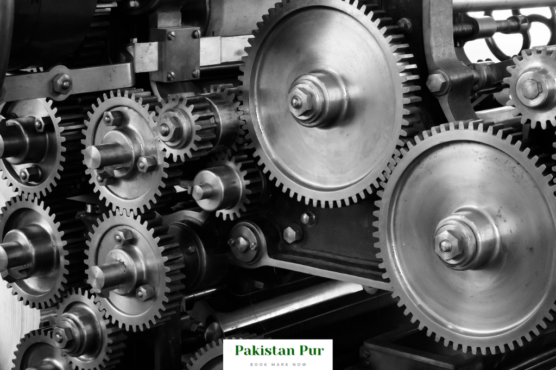




Leave a Reply